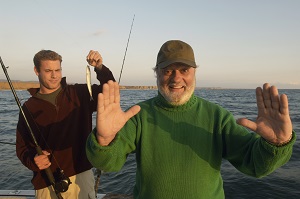 You cannot close a sale with the latest technology, the best National Traffic Safety Bureau ratings or a wall lined with J.D. Powers awards. You can’t even close one with mathematical proof that you’ve offered the best deal possible.
You cannot close a sale with the latest technology, the best National Traffic Safety Bureau ratings or a wall lined with J.D. Powers awards. You can’t even close one with mathematical proof that you’ve offered the best deal possible.
That’s because seventy percent of your customer’s buying experience comes from how they feel. Even if facts fill in some of the remaining thirty percent, feelings close.
How To Target Your Audience
Fortunately, people are predictable enough for us to develop a set of best practices that will improve your customer’s feelings in a focused way.
First of all, your salesperson needs to know a huge amount of information off the top of her head. From product knowledge to warranty terms, to insurance policies and payment options, she has to have it down. You’ll know she’s got it when she doesn’t say a word about any of it to a prospect; people confident in their knowledge don’t need to show off.
A good salesperson tells a story, and the workings of a story are well known. Screenwriters make sure that every scene moves from pleasure to pain or from pain to pleasure because that’s what keeps people engaged. Composers take advantage of the fact that people’s brains start producing dopamine in anticipation of the great climax, which you can manipulate to keep them delirious for a longer period until you give them the release they need.
Natural salespeople focus almost all of their energy here. The hero of the story, obviously, is the customer or someone just like the customer, and whereas their current situation is painful, purchasing the car will solve their problems and give them great pleasure. The natural will toy with them for some time as they deliberate, because while the customer explores his feelings he will inevitably also reveal pieces of information relevant to the mechanics of the sale. A good salesperson makes mental notes but doesn’t pursue any points while still in the story’s dream-like state.
The Story Is the Sale
Here’s an ad that demonstrates this perfectly. The viewer immediately identifies with the story’s main character and also wants to do something beautiful that will prove friendship transcends history, politics and religion. If you don’t have tears in your eyes at the end, check for your pulse.
But here’s the main point: the product being sold is never mentioned, although it is shown over a dozen times and in as many different ways:
Hover over the video and click on CC to turn on closed captioning
This demonstrates another critical aspect of storytelling: as Picasso taught us, art is about removing everything “except the essential.” He once demonstrated this with a series of drawings of – what else? – a bull, starting with a life-like likeness and stripping it down to its essence
In the art of the sale, most of what your salesperson knows is not essential. She better know it, so when a specific question demanding a factual answer comes up she can handle it quickly and confidently. But she should focus on what’s really essential, which is the story that has engaged the customer – and, critically, the structure of the story that she wants to finish.
Story Structure = Everything You Offer
The structure of the story includes all of the offers that your business provides, and good salespeople will weave every offer into every story told to every customer.
A good storyteller doesn’t worry if his story doesn’t close the first time because, as the poet William Butler Yeats said, "I always think a great speaker convinces us not by force of reasoning, but because he is visibly enjoying the beliefs he wants us to accept."
After all 80% of sales are made between the fifth and the twelfth contact, so there may be a lot of storytelling in between the facts. Cars are expensive and buying one is a big decision; any prudent person would take his time and consider carefully.
However, any human person is far more likely to come back to the storyteller than to an “information robot” who never smiles. A salesperson who conveys the “enjoyment” Yeats mentions doesn’t need to worry about quotas. She doesn’t need to worry about logic or information, either – in fact, she can probably ignore mathematics in its entirety.
Omit Nothing
But she will make sure to lead her prospect through every single offer she has at her disposal. The last thing she wants to do is to waste all her storytelling effort by missing something that could have saved the sale or made it pay more.
She makes no assumptions because good salespeople are also scientists: they know that telepathy is impossible, and that any guess she makes about what the customer does or doesn’t want will be blind and might cost her business.
Leasing options? Financing? Service agreements? GAP insurance? Multiple- or hold-check option for upfront costs?
Omit nothing. F&I Magazine explains:
Capabilities Do Matter A Little Bit
It’s at the very end of the sale, perhaps even in the F&I department, that information becomes important again. The practical details transferring ownership and establishing payment don’t easily fit a storytelling narrative, and so as the general manager or owner you need to step up at this point and make sure your salespeople have the practical, real-world tools they need to capitalize on their storytelling talent.
In the past decade, as the prevalence of credit cards declined nearly 65%, one in five people reported increasing their use of checks and your customer will almost certainly intend to write one, since most are written for amounts over $100. Of course you need a check processor to guarantee the check, but you might want to work with one that allows you to offer your customer the option to write two to four checks today that will be deposited over the course of the next thirty days. Ever heard of Remote Deposit Capture? With RDC, you don't even have to go to the bank to deposit checks.
It’s not financing since there’s no interest or terms; it’s simply a way to make sure that one of the stories your salesperson was telling – the one about your dealership – includes all the essential elements needed to close the sale and to take care of your customer. Learn more about C.A.R.S., our auto dealer check processing solution that includes guarantee, multiple check, remote deposit capture and more.



